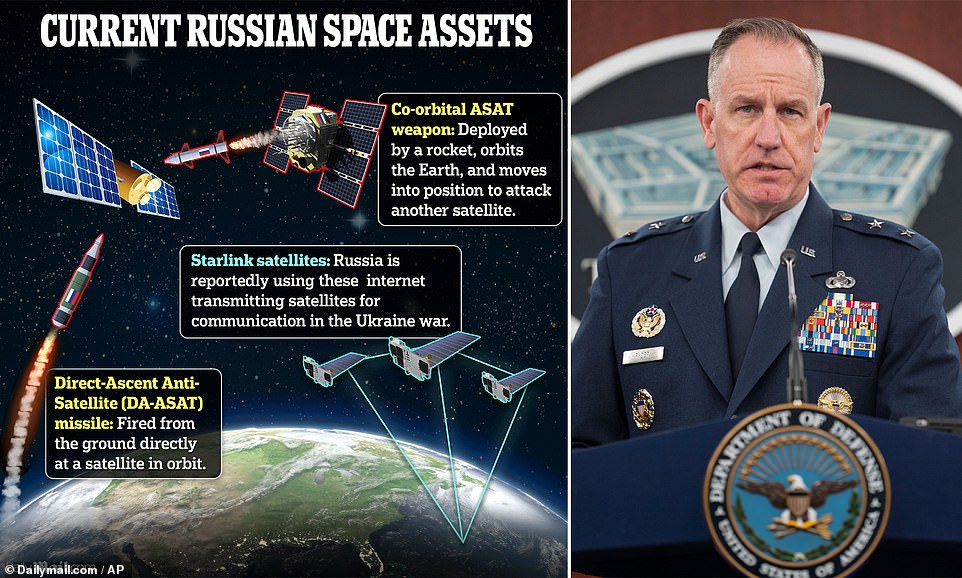Advertisement

The U.S. has confirmed that Russia has launched a potential counter space weapon into the same orbit as an American satellite. Major General Pat Ryder (pictured right) revealed news at a press conference Tuesday, after U.S. Ambassador Robert Wood made the initial allegation to the UN on Monday.

‘What I’m tracking here is on May 16, as you highlighted, Russia launched a satellite into low Earth orbit that we that we assess is likely a counter space weapon presumably capable of attacking other satellites in low Earth orbit,’ Ryder (pictured) told ABC News. ‘Russia deployed this new counter space weapon into the same orbit as a U.S. government satellite,’ he added. ‘And so assessments further indicate characteristics resembling previously deployed counter space payloads from 2019 and 2022.’ It came after Wood made the statement to the UN on Monday, coming as the United States and Russia have drafted rival resolutions in an attempt to outlaw weapons in space.

The drafts focused on different types of weapons, with the U.S. and Japan specifying weapons of mass destruction. The Russian draft discussed all types of weapons. Members of the United Nations Security Council condemned the actions even as they failed to pass a measure against it. ‘The culmination of Russia’s campaign of diplomatic gaslighting and dissembling is the text before us today,’ U.S. deputy ambassador Robert Wood (pictured) told the council.

Russia’s U.N. ambassador, Vassily Nebenzia (pictured), denied that his nation was trying to mislead the world. Backed by China and others, he called the vote ‘a unique moment of truth for our Western colleagues.’ ‘If they fail to support this, then they will clearly show that their main priority remains keeping freedom of the way for themselves to expedite the militarization of outer space,’ Nebenzia said. Every nation says it wants weapons barred from space, and council members repeated that Monday.

But when it came time to vote, the council evenly split 7-7 between backers of the U.S. and of Russia, with Switzerland abstaining. The measure failed under U.N. rules because it didn’t receive nine votes. Ryder said that the U.S. remains vigilant at what appears to be Russia’s attempt to weaponize space. ‘Obviously, that’s something that we’ll continue to monitor,’ he said. ‘Certainly, we would say that we have a responsibility to be ready to protect and defend the space domain and ensure continuous and uninterrupted support to the joint and combined force. And we’ll continue to balance the need to protect our interests in space with our desire to preserve a stable and sustainable space environment,’ he added.

Ryder would not say if the U.S. knew in advance that Russia was making the launch. In early May, a Pentagon official warned lawmakers that Russia’s development of a nuclear space satellite could knock out all other global satellites for up to a year. Satellites aren’t built to withstand the radiation from a nuclear explosion and some could be destroyed by the blast and have ‘devastating’ consequences for the U.S. and other countries’ capabilities in space. This marks the first time the Biden administration has openly discussed the ‘indiscriminate weapon’ at an open Congressional hearing, after a bombshell revelation by lawmakers in February.

Meanwhile, China has launched the first mission to collect samples from the dark side of the moon, even as the U.S. government has warned that China could claim ownership of the moon if it reached the lunar surface first. ‘The concept that we are concerned about is Russia developing and — if we are unable to convince them otherwise — to ultimately fly a nuclear weapon in space which will be an indiscriminate weapon,’ John Plumb, the assistant secretary of defense for space policy, said at a House Armed Services subcommittee hearing. He added that the weapon wouldn’t distinguish between civilian, commercial or military satellites which provide cell phone reception, internet access and data about foreign threats.

SpaceX’s Starlink has 5,400 satellites in orbit that have been vital to Ukraine remaining online and having communication capabilities during the ongoing Russian invasion. In February, lawmakers first warned that Russia was developing a nuclear anti-satellite, also called a nuclear EMP, that posed a ‘serious national security threat’ to the U.S. ‘Our general knowledge of Russian pursuit of this kind of capability goes back many, many months, if not a few years,’ National Security Council spokesman John Kirby told CNN at the time. ‘But only in recent weeks now has the intelligence community been able to assess with a higher sense of confidence exactly how Russia continues to pursue it.’

The weapon has not yet been placed in space and Plumb said there isn’t an ‘imminent’ threat to public safety, and the anti-satellite wouldn’t be able to attack humans or cause physical destruction on Earth. However, if the nuclear EMP is deployed, it ‘could pose a threat to all satellites operated by countries and companies around the globe, as well as to the vital communications, scientific, meteorological, agricultural, commercial, and national security services we all depend upon,’ Plumb said.

Shortly after lawmakers said Russia was building the anti-satellite nuclear weapon, Russian President Vladimir Putin vehemently denied the reports during a meeting with his defense minister in Moscow and claimed he was against deploying nuclear weapons in space. Concerns over Russia’s potential impact on space satellites come as China launched the Chang E’ 6 mission to the dark side of the moon on Friday, making it the first country to deploy a mission to the region. Last month, NASA warned that China could be using its civilian space program as a cover for military operations and their plans to create a landing base on the lunar surface could pose a threat to national security.

Want more stories like this from the Daily Mail? Hit the follow button above for more of the news you need.
This article was originally published by a www.dailymail.co.uk . Read the Original article here. .


